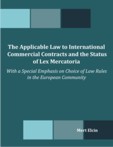Add abstract
Want to add your dissertation abstract to this database? It only takes a minute!
Search abstract
Search for abstracts by subject, author or institution
Want to add your dissertation abstract to this database? It only takes a minute!
Search for abstracts by subject, author or institution
by Stephanie R Fahy
| Institution: | Northeastern University |
|---|---|
| Year: | 2016 |
| Keywords: | cognitive representations; juvenile prostitution; law enforcement; perceptions; safe harbor law; sex trafficking of minors; Teenage prostitution; Government policy; Human trafficking victims; Government policy; Juvenile justice, Administration of; C |
| Posted: | 02/05/2017 |
| Record ID: | 2085147 |
| Full text PDF: | http://hdl.handle.net/2047/D20200779 |
Minors involved in prostitution have traditionally been perceived and treated as criminals or delinquents within the criminal justice system despite the passage of laws, including federal and state human trafficking statutes, which define them as victims in need of treatment rather than criminals deserving of punishment. Because of the disparity between existing laws that define these youth as victims and their subsequent treatment within the criminal justice system, dozens of states have passed safe harbor laws, which are designed to grant minors who are arrested for prostitution immunity from prosecution or redirect them into victim services. The types of safe harbor laws vary by state, however, with some laws granting minors arrested for prostitution immunity from prosecution while others leave their fate to the discretion of criminal justice officials. Cognitive representations, or stereotypes and attitudes about criminals and victims may guide criminal justice officials' decision making processes in states with discretionary laws. This study includes in-depth interviews with criminal justice officials working in two counties in Massachusetts-a state with a safe harbor law that is discretionary in nature-that reveal cognitive representations of minors involved in prostitution that are shared by criminal justice agents both before and after the passage of the safe harbor law. This study also examines how cognitive representations are reflected in case processing decisions prior to and following the law. Finally, cognitive representations are compared between sites in order to understand if there are 'clusters of representations' that are unique to criminal justice agents in each site and how these 'clusters of representations' guide decisions about minors involved in prostitution.
Want to add your dissertation abstract to this database? It only takes a minute!
Search for abstracts by subject, author or institution


|
Time for the Appeal Tribunal in Investment Arbitra...
Lessons from WTO and Transitioning to the New Era
|

|
Identifying Juvenile Firesetters
A Survey of the Operating Procedures, Risk Assessm...
|

|
Implicity of Electronic Contract Formation
With Reference to Email and Website
|

|
Prisons in the Neoliberal Era
Class and Symbolic Dimensions
|

|
The Applicable Law to International Commercial Con...
With a Special Emphasis on Choice of Law Rules in ...
|

|
Incapacitating the Innocent
An Investigation of Legal and Extralegal Factors A...
|

|
Reasons for Disclosure in the Physician-Patient Re...
How Physician Conduct and Reimbursement Methodolog...
|

|
The Contribution of Natural Law Theory to Moral an...
|